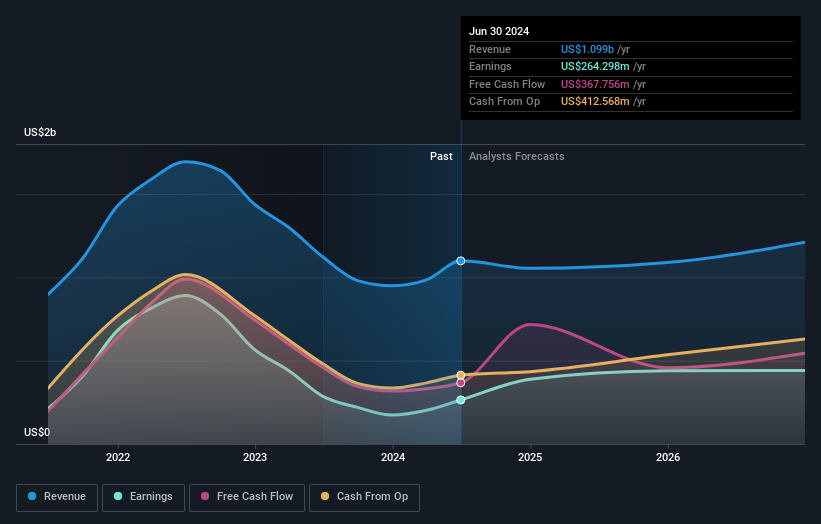- United States
- /
- Marine and Shipping
- /
- NasdaqGS:SBLK
Star Bulk Carriers Corp. (NASDAQ:SBLK) surges 6.7%; retail investors who own 50% shares profited along with institutions

Key Insights
- Significant control over Star Bulk Carriers by retail investors implies that the general public has more power to influence management and governance-related decisions
- 37% of the business is held by the top 25 shareholders
- Institutional ownership in Star Bulk Carriers is 45%
If you want to know who really controls Star Bulk Carriers Corp. (NASDAQ:SBLK), then you'll have to look at the makeup of its share registry. We can see that retail investors own the lion's share in the company with 50% ownership. Put another way, the group faces the maximum upside potential (or downside risk).
Retail investors gained the most after market cap touched US$2.4b last week, while institutions who own 45% also benefitted.
In the chart below, we zoom in on the different ownership groups of Star Bulk Carriers.
See our latest analysis for Star Bulk Carriers

What Does The Institutional Ownership Tell Us About Star Bulk Carriers?
Many institutions measure their performance against an index that approximates the local market. So they usually pay more attention to companies that are included in major indices.
As you can see, institutional investors have a fair amount of stake in Star Bulk Carriers. This can indicate that the company has a certain degree of credibility in the investment community. However, it is best to be wary of relying on the supposed validation that comes with institutional investors. They too, get it wrong sometimes. It is not uncommon to see a big share price drop if two large institutional investors try to sell out of a stock at the same time. So it is worth checking the past earnings trajectory of Star Bulk Carriers, (below). Of course, keep in mind that there are other factors to consider, too.

We note that hedge funds don't have a meaningful investment in Star Bulk Carriers. Looking at our data, we can see that the largest shareholder is Brookfield Corporation with 4.4% of shares outstanding. Meanwhile, the second and third largest shareholders, hold 3.5% and 3.5%, of the shares outstanding, respectively. Additionally, the company's CEO Petros Pappas directly holds 3.4% of the total shares outstanding.
A deeper look at our ownership data shows that the top 25 shareholders collectively hold less than half of the register, suggesting a large group of small holders where no single shareholder has a majority.
Researching institutional ownership is a good way to gauge and filter a stock's expected performance. The same can be achieved by studying analyst sentiments. There are a reasonable number of analysts covering the stock, so it might be useful to find out their aggregate view on the future.
Insider Ownership Of Star Bulk Carriers
The definition of company insiders can be subjective and does vary between jurisdictions. Our data reflects individual insiders, capturing board members at the very least. The company management answer to the board and the latter should represent the interests of shareholders. Notably, sometimes top-level managers are on the board themselves.
Insider ownership is positive when it signals leadership are thinking like the true owners of the company. However, high insider ownership can also give immense power to a small group within the company. This can be negative in some circumstances.
Shareholders would probably be interested to learn that insiders own shares in Star Bulk Carriers Corp.. This is a big company, so it is good to see this level of alignment. Insiders own US$81m worth of shares (at current prices). It is good to see this level of investment by insiders. You can check here to see if those insiders have been buying recently.
General Public Ownership
The general public, mostly comprising of individual investors, collectively holds 50% of Star Bulk Carriers shares. With this amount of ownership, retail investors can collectively play a role in decisions that affect shareholder returns, such as dividend policies and the appointment of directors. They can also exercise the power to vote on acquisitions or mergers that may not improve profitability.
Next Steps:
While it is well worth considering the different groups that own a company, there are other factors that are even more important. Consider for instance, the ever-present spectre of investment risk. We've identified 3 warning signs with Star Bulk Carriers , and understanding them should be part of your investment process.
If you would prefer discover what analysts are predicting in terms of future growth, do not miss this free report on analyst forecasts.
NB: Figures in this article are calculated using data from the last twelve months, which refer to the 12-month period ending on the last date of the month the financial statement is dated. This may not be consistent with full year annual report figures.
New: Manage All Your Stock Portfolios in One Place
We've created the ultimate portfolio companion for stock investors, and it's free.
• Connect an unlimited number of Portfolios and see your total in one currency
• Be alerted to new Warning Signs or Risks via email or mobile
• Track the Fair Value of your stocks
Have feedback on this article? Concerned about the content? Get in touch with us directly. Alternatively, email editorial-team (at) simplywallst.com.
This article by Simply Wall St is general in nature. We provide commentary based on historical data and analyst forecasts only using an unbiased methodology and our articles are not intended to be financial advice. It does not constitute a recommendation to buy or sell any stock, and does not take account of your objectives, or your financial situation. We aim to bring you long-term focused analysis driven by fundamental data. Note that our analysis may not factor in the latest price-sensitive company announcements or qualitative material. Simply Wall St has no position in any stocks mentioned.
About NasdaqGS:SBLK
Star Bulk Carriers
A shipping company, engages in the ocean transportation of dry bulk cargoes worldwide.
Adequate balance sheet average dividend payer.


